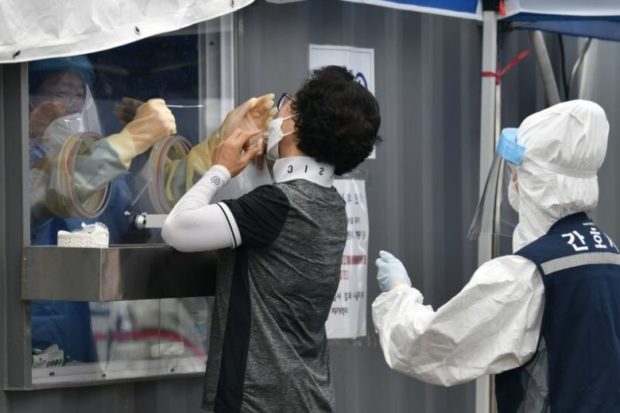South Korea reels from double whammy of growing untraceable COVID-19 cases, critically ill patients

Over one-fifth of the cases reported in the past two weeks cannot be traced. AFP via The Straits Times/Asia News Network
SEOUL — South Korea is grappling with a double whammy of rising untraceable Covid-19 cases and a sudden spike in critically-ill patients, as the total tally of infections crossed the 20,000 mark for the first time due to a new wave of cases.
Once hailed as a role model for successfully curbing the outbreak with aggressive contact tracing and massive testing, the country is now struggling to cope with fresh infections.
Over one-fifth of the cases reported in the past two weeks cannot be traced – the highest to date, according to the Korea Centers for Disease Control and Prevention (KCDC).
This makes it harder for health officials to conduct epidemiological studies and quarantine close contacts who are possibly infected as well, to stop them from spreading the virus.
Furthermore, four in 10 cases do not display any symptoms.
Article continues after this advertisementObservers said these unknown cases could be somehow linked to the Aug 15 rally in Gwanghwamun Plaza in central Seoul, which has so far given rise to 422 infections.
Article continues after this advertisementSome 50,000 people from all over the country participated in the rally, but not all have gone for testing.
Hundreds of members of the Sarang Jeil Church, which organized the rally, remain uncontactable. The church, which has over 4,000 members, has since reported 1,080 cases, including its pastor.
The city of Seoul has ordered bus chartering services to start collecting passenger data as many of them ferry people going for rallies and mass church events.
The inability to trace contacts may cripple South Korea’s preparedness against Covid-19 at a time when its medical facilities are straining to cope with the rising cases.
The country reported 235 new cases on Tuesday (Sept 2), bringing the total to 20,182. About a quarter of those emerged last month, tied to a new wave of infections that sent daily figures to over 100 from Aug 14. The death toll stood at 324 as of Tuesday.
Health officials have warned that the country is running short of medical professionals who can treat critically ill patients due to an indefinite strike by trainee doctors since Aug 21. They are protesting against plans by the government to reform the healthcare system.
This is worrisome as the number of patients in critical condition has surged to 104 as of Monday – up from just nine on Aug 18. Elderly patients aged 60 and above, many with underlying health conditions, accounted for over 30 per cent of the cases last week, said health officials.
As of now, only 43 beds are available nationwide to treat seriously ill patients, including nine in Seoul. The occupancy rate for hospital beds set aside for patients in Seoul and greater Seoul has reached 76 per cent.
Meanwhile, the Finance Ministry has warned that tightened social distancing measures will hurt the economy.
New restrictions that went into effect last Sunday, dubbed Level 2.5 in a three-tier system, include the shutting down of private academies and indoor sports facilities. Cafe chains have also been ordered to switch to takeaways and a 9pm limit imposed for dine-in at all restaurants to discourage social gatherings by young people who make up nearly 40 per cent of cases detected last week.
During a briefing with senior officials on Tuesday Vice-Finance Minister Kim Yong-beom promised that the government would strengthen support measures to help people cope with the economic fallout. This could include a second round of emergency handouts – after the government doled out “disaster relief funds” worth 14.3 trillion won (S$16.40 billion) to all households in May.
Central bank data shows that South Korea’s economy shrank by 3.2 per cent in the second quarter – the sharpest contraction since 2008. Exports fell for six consecutive months.
Many people in the meantime are taking no chances, deciding to stay at home.
Communications manager John Lee, 32, told The Straits Times that he and his wife decided to self quarantine together with their 14-month son after returning to Seoul from a short vacation to the eastern Gangwon province last week.
“We just stayed at home and ordered food in,” said Mr Lee, who has been working from home since March. “We used to eat out at nice restaurants, but now, I just use the food delivery app.”
For more news about the novel coronavirus click here.
What you need to know about Coronavirus.
For more information on COVID-19, call the DOH Hotline: (02) 86517800 local 1149/1150.
The Inquirer Foundation supports our healthcare frontliners and is still accepting cash donations to be deposited at Banco de Oro (BDO) current account #007960018860 or donate through PayMaya using this link.